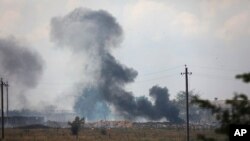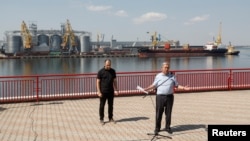A fire at a munitions depot near the Russian village of Timonovo has led to the evacuation of two villages in Russia's Belgorod region on Ukraine’s northeastern border, an official said Friday. The blaze was the latest in a series of destructive incidents on Russian-occupied territory in Ukraine or inside Russia itself.
Roughly 1,100 people reside in the villages of Timonovo and Soloti, about 25 kilometers from the Ukrainian border. There were no casualties in the blaze late Thursday, Belgorod regional governor Vyacheslav Gladkov said.
The fire came days after another ammunition depot exploded on the Crimean Peninsula, a Russian-occupied territory on the Black Sea that was annexed by Moscow in 2014.
Last week, nine Russian warplanes were reported destroyed at an airbase on Crimea, demonstrating both the Russians’ vulnerability and the Ukrainians’ capacity to strike deep behind enemy lines. Ukrainian authorities have stopped short of publicly claiming responsibility.
But President Volodymyr Zelenskyy alluded to Ukrainian attacks behind enemy lines after the blasts in Crimea, which Russia has blamed on “sabotage.”
Russian Deputy Foreign Minister Sergei Ryabkov said in televised remarks Friday that statements from Ukrainian officials about striking facilities in Crimea mark “an escalation of the conflict openly encouraged by the United States and its NATO allies.”
Russia worries about U.S. involvement
Ryabkov said Russian officials had warned the U.S. against such actions in phone calls with high-level members of the Biden administration, adding that “deep and open U.S. involvement” in the war in Ukraine "effectively puts the U.S. on the brink of becoming a party to the conflict.”
“We don’t want an escalation," Ryabkov said. "We would like to avoid a situation where the U.S. becomes a party to the conflict, but so far we haven’t seen their readiness to deeply and seriously consider those warnings.”
Despite the latest incidents, a Western official said the war is at a “near operational standstill,” with neither side able to launch major offensives.
“The whole tempo of the campaign has slowed down, partly because both sides have become more conscious that this is a marathon not a sprint and that expenditure rates and conserving their munitions is important,” said official said who spoke on condition of anonymity because he's not authorized to discuss intelligence matters publicly.
Meanwhile, Kyiv and Moscow continued to accuse each other of shelling Europe’s largest nuclear power plant, stoking international fears of a catastrophe on the continent.
Putin, Macron discuss nuclear plant
The Kremlin said Friday that Russian President Vladimir Putin told French counterpart Emmanuel Macron in their first phone conversation since May 28 that Ukrainian shelling around the Zaporizhzhia nuclear power plant “raised the threat of a large-scale catastrophe that could lead to radioactive contamination of large territories.”
The Zaporizhzhia nuclear facility in Ukraine's south has been controlled by Russian forces since shortly after the invasion began on Feb. 24. Ukraine has accused Russia of storing troops and weapons at the plant and using its grounds to launch strikes against Ukrainian-controlled territory. Ukrainian officials and military analysts say Moscow’s forces have cynically employed the plant as a shield, knowing that the Ukrainians would be hesitant to fire back.
Russia has denied the accusations and, in turn, accused Ukrainian forces of repeatedly shelling the plant.
The French presidency said in a statement that Macron “underlined his concerns” regarding the situation at the Zaporizhzhia plant and expressed his support for the deployment of a International Atomic Energy Agency mission to the site “as soon as possible.”
Putin agreed to the mission's deployment under the discussed terms, according to the French statement. The Kremlin said that “the Russian side reaffirmed its readiness to offer the necessary assistance to the agency’s experts.”
Yevgeny Balitsky, the Moscow-backed chief of temporary administration for the Russia-controlled part of the Zaporizhzhia region, said Friday that an IAEA mission could approach the plant from Ukrainian-held territory, a shift in Moscow’s position which previously had suggested that the mission should travel to the plant from Crimea.
“I believe they may also come from the side of Ukraine,” Balitsky said in televised remarks. “We can safely bring them to the plant and show where the fire is coming from and who is shooting.”
Mikhail Ulyanov, the Russian envoy to international organizations in Vienna where the IAEA is based, said he believes a visit by the agency could realistically take place in early September.
Following a Thursday visit to Ukraine, Turkish President Recep Tayyip Erdogan said that Zelenskyy had asked him to ensure that Russia remove weapons stored at the plant as an “important step for world peace.”
“Zelenskyy asked this of us especially: that Russia remove all mines and similar [weapons] there and for the issue to rapidly cease to be frightening. Because it is a threat,” Erdogan said.
Erdogan, whose country has maintained close relations with both Ukraine and Russia, said he would discuss the issue with Russian President Vladimir Putin, saying that “Russia must do its part in this regard.”
In other developments:
— U.N. Secretary-General António Guterres visited a port in the coastal Ukrainian city of Odesa, where he praised ongoing efforts to maintain a shipping corridor on the Black Sea allowing for the export of vital Ukrainian grain shipments. Guterres said that 25 ships have departed from Odesa and other Ukrainian ports since Russia and Ukraine signed a four-month grain export deal in July.
Those ships have carried more than 600,000 tons of grain and other food supplies like wheat, corn, sunflower oil and soybeans, Guterres said, adding that getting more food and fertilizer out of Ukraine and Russia is crucial to further calm global commodity markets and lower prices. Guterres also urged unimpeded access to global markets of Russian food and fertilizer, which aren't subject to sanctions. “Without fertilizer in 2022, there may not be enough food in 2023,” he said.
— At least five people were killed and 10 others wounded by the Russian shelling of towns and villages in Ukraine's eastern Donetsk region, according to regional authorities. Russian shelling of the city of Kharkiv also killed at least one civilian early Friday. Russian missiles again struck port facilities and a university building in the southern port city of Mykolaiv.





